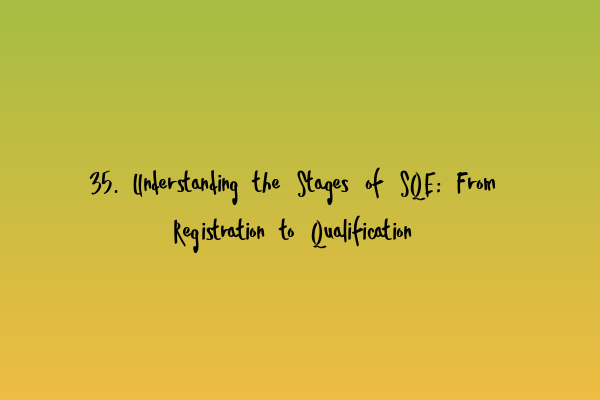35. Understanding the Stages of SQE: From Registration to Qualification
If you have decided to pursue a career in law and become a qualified solicitor in England and Wales, you must navigate through the stages of the Solicitors Qualifying Examination (SQE). The SQE is a comprehensive examination that assesses your legal knowledge and skills to ensure you meet the high standards required to practice law.
In this article, we will delve into the different stages of the SQE and provide you with a detailed understanding of what each stage entails.
1. Registration
The first step in your SQE journey is to register for the examination. This involves providing your personal details, educational qualifications, and any relevant work experience. The registration process also includes the payment of fees, which may vary depending on the stage of the examination you are registering for.
Once you have completed the registration process, you will receive a unique candidate number and login details for the SQE portal. This portal will be your go-to resource for accessing study materials, scheduling exams, and receiving updates throughout your SQE journey.
2. SQE1: Assessing Functioning Legal Knowledge
SQE1 is the first part of the examination and focuses on assessing your functioning legal knowledge. This stage consists of multiple-choice questions (MCQs) and will test your knowledge and understanding of the core areas of law.
To excel in SQE1, it is crucial to master time management and develop effective strategies for exam completion. Additionally, analyzing your mock results and identifying areas of improvement can significantly enhance your performance in this stage.*
For more information on conquering the MCQs in SQE1, refer to the article: Conquer the Multiple Choice Questions (MCQ) in SQE1.
3. SQE2: Testing Practical Legal Skills
SQE2 is the second part of the examination and focuses on testing your practical legal skills. This stage consists of practical assessments that simulate real-life legal scenarios. You will be expected to apply your legal knowledge and skills to solve these scenarios effectively.
One effective way to prepare and apply your legal knowledge is by studying SQE case studies that provide you with real-life scenarios. These case studies can help you understand how to apply your knowledge in practical situations. For more information, check out the article SQE Case Studies: Applying Knowledge in Real-Life Scenarios.
4. Qualification and Admission
Once you have successfully completed both SQE1 and SQE2, you can apply for qualification and admission as a solicitor. This involves providing evidence of completion of the SQE and meeting other relevant requirements set by the Solicitors Regulation Authority (SRA).
It is essential to stay organized throughout your SQE journey and master time management skills to ensure efficient exam completion. For strategies on time management, refer to the article Mastering Time Management in SQE: Strategies for Efficient Exam Completion.
Once your qualification and admission application is approved, you can proudly call yourself a qualified solicitor in England and Wales and begin your exciting legal career.
In Conclusion
The SQE is a rigorous examination that assesses your legal knowledge and skills to ensure you are fully equipped to practice law as a qualified solicitor. Understanding the stages of the SQE, from registration to qualification and admission, is crucial for successfully navigating through the examination process.
By mastering time management skills, utilizing SQE case studies, analyzing mock results, and effectively conquering the multiple-choice questions in SQE1, you can enhance your performance and increase your chances of qualifying as a solicitor.
For more information on the SQE and other relevant topics, be sure to explore the following articles:
- SQE Case Studies: Applying Knowledge in Real-Life Scenarios
- Solicitors Qualifying Examination (SQE): Your Gateway to Legal Practice
- Mastering Time Management in SQE: Strategies for Efficient Exam Completion
- Analyzing Mock Results for SQE: Identifying Areas of Improvement
- Conquer the Multiple Choice Questions (MCQ) in SQE1
Good luck in your SQE journey and future legal career!
